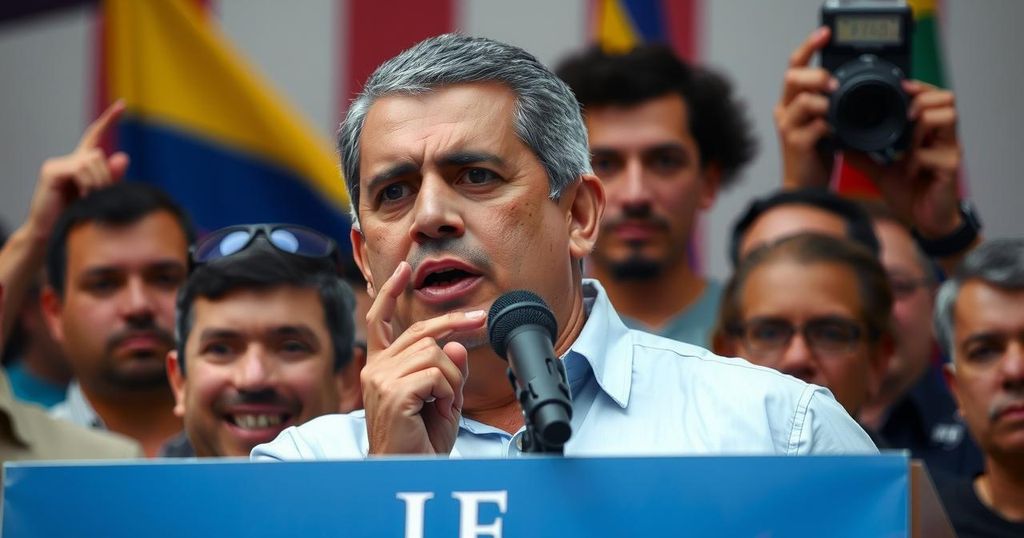Venezuelan President Nicolás Maduro is poised to take office for a third term, facing significant protests and international backlash against alleged election fraud. Opposition leader María Corina Machado was briefly detained following a demonstration, prompting global condemnation. The Maduro government continues to face scrutiny, with world leaders calling for respect of human rights and democratic processes in Venezuela.
On Friday, Venezuelan President Nicolás Maduro is set to take the oath of office for a third term despite widespread protests and international condemnation regarding the recent elections. Leading these protests is opposition leader María Corina Machado, who was recently detained after emerging from hiding to join a demonstration in Caracas. Her detention reignited concerns over the legitimacy of Maduro’s rule and the repression faced by opposition figures.
Though the government claimed no arrest occurred, reports indicate Machado was intercepted by security forces during a rally, with witnesses describing gunfire as she was forcibly taken away. This incident has drawn critical reactions from global leaders, including President-elect Donald Trump, who described Machado and another opposition candidate as “freedom fighters” and emphasized the need for their safety.
Countries such as Ecuador, Spain, and Colombia have denounced Maduro’s government, labeling it a dictatorship and condemning the systematic harassment of Machado. Italian Prime Minister Giorgia Meloni also criticized the Maduro administration for its oppressive actions, asserting a commitment to support democratic reforms in Venezuela.
In Caracas, Machado defiantly addressed her supporters, asserting, “We are not afraid,” even as her detention has added to the oppressive atmosphere key opposition leaders face. Concurrently, the Venezuelan government has intensified its crackdown, resulting in arrests and violent repression amidst allegations of arbitrary detention, as reported by the United Nations.
Having maintained power since 2013 following the death of Hugo Chávez, Maduro’s rule has faced accusations of election fraud and severe economic decline. Supported by loyal military forces and international allies including Russia and Cuba, Maduro’s authority remains contested locally and globally as he prepares to assume office amid a backdrop of dissent and societal unrest.
The current political climate in Venezuela is marked by severe tensions between the government of Nicolás Maduro and opposition forces advocating for democratic governance. The recent elections, heavily criticized by international observers as fraudulent, have intensified calls for accountability and reform. Prominent opposition leaders such as María Corina Machado face significant risks, including harassment and detention, reflecting the broader challenges confronting those who oppose Maduro’s regime. The international community continues to monitor the situation, advocating for humanitarian support and democratic transitions in Venezuela. Since Maduro’s assumption of power in 2013, Venezuela has experienced a profound economic crisis, contributing to widespread protests against his administration. Notably, Maduro’s reliance on military and paramilitary support to maintain control has been a focal point of outrage, fueling both internal dissent and international disapproval.
In summary, Nicolás Maduro’s impending inauguration amid substantial protests and the recent detention of opposition leader María Corina Machado highlights the ongoing struggle for democracy in Venezuela. Global leaders have condemned Maduro’s actions, calling attention to the oppressive tactics utilized against dissenting voices. As opposition leaders face unprecedented risks, the legitimacy of Maduro’s government remains under question, and the call for a transition to democratic rule persists strongly among both local and international communities.
Original Source: www.cbsnews.com






